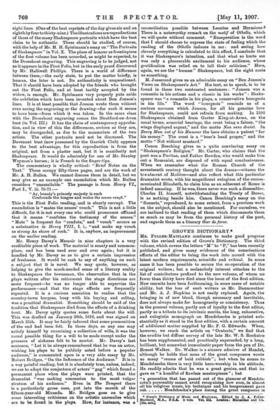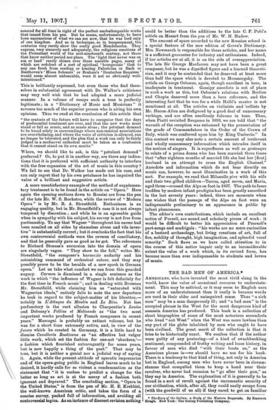GROVE'S DICTIONARY.•.
Ma. Fumita-Marmawn continues to make good progress with the revised edition of Grove's Dictionary. The third volume, which covers the letters "M" to "P," has been recently published, and gives many evidences of the conscientious efforts of the editor to bring the work into accord with the latest modern requirements, scientific and critical. In some cases it has been possible to secure the co-operation of the original writers; but a melancholy interest attaches to the list of contributors prefixed to the new volume, of whom no fewer than thirty have died since the issue of the first edition. New recruits have been forthcoming, in some cases of notable ability, but the loss of such writers as Mr. Dannreuther and Mr. A. J. Hopkins is not easily replaced. Again, the bringing in of new blood, though necessary and inevitable, does not always make for homogeneity or consistency. Thus in the present volume, partly out of loyalty to the first editor, partly as a tribute to its intrinsic merits, the long, exhaustive, and eulogistic monograph on Mendelssohn is printed sub- stantially as it stood in the first edition, with a certain amount of additional matter supplied by Mr. F. G. Edwards. When, however, we reach the article on "Oratorio," we find that the erudite but diffuse surrey of the late Mr. W. S. Rockstro has been supplemented, and practically superseded, by a long, brilliant, but somewhat iconoclastic paper from the pen of Dr. Ernest Walker. Dr. Walker is a sincere admirer of Handel, although he holds that none of the great composers wrote so many "reams of bald rubbish"; but when he comes to Mendelssohn there is very little hero-worship in his attitude. He readily admits that he was a great genius, and that ho gave us " a handful of flawless masterpieces" ; but
"a generation that has passed out of the glamour of Mendels- sohn's personality cannot avoid recognising how soon, in almost all his religious music, his technique and his temperament gave out Mendelssohn's place among the great composers is
• Grow's Elegem., y of Musts and Maltese:. Edited by J. A. Fidler. Ifeitland,_ b vols. Vol. ILL Leiden r D(aosaillan and Co. 1.21e. !Lew . .
assured for all time in right of the perfect unchallengeable works that issued from his pen. But he seems, unfortunately, to have been unconscious of what we can see now, that he was lord only of one kingdom. And as in technique, so in temperament, the oratorios very rarely show the really good Mendelssohn. They express, very sincerely and adequately, the religions emotions of the Protestant world of the mid-nineteenth century, not those that know neither period nor place. The light that never was on sea or land' rarely shines over these amiable pages, many of which are redolent of a sort of spiritual 'bourgeoisie' that to any one fresh from reading or hearing Palestrina or Bach or Beethoven's 'Idissa Solennis' or Brahms's Deutsches Requiem' would seem almost unbearable, were it not so obviously well- intentioned."
This is brilliantly expressed, but even those who find them- selves in substantial agreement with Dr. Walker's criticisms may very well wish that he had adopted a more judicial manner. In a volume of essays such a tone is perfectly legitimate ; in a "Dictionary of Music and Musicians" it savours too much of the superior person who is airing his own opinions. Thus we read at the conclusion of this article that
"the oratorio of the future will have to recognise that the days of preferential treatment are over, and that the new works must stand or fall as music, and as music alone ; the petulant demand to be heard solely in surroundings where non-musical associations are overwhelming, and where the voice of criticism is silenced, can no longer be tolerated, and the plea that a work can only be fairly judged in a mediaeval cathedral most be taken as a confession that it cannot stand on its own merits."
Where, we should like to ask, is this "petulant demand" preferred P Or, to put it in another way, are there any indica- tions that it is preferred with sufficient authority to interfere with the free expansion of the art of music in this country ? We fail to see that Dr. Walker has made out his case, and can only regret that by his own petulance he has impaired the value of a brilliant and suggestive article.
A more unsatisfactory example of the method of supplemen- tary treatment is to be found in the article on " Opera." Here again the opening sections down to Rossini are from the pen of the late Mr. W. S. Rockstro, while the review of "Modern Opera" is by Mr. R. A. Streatfeild. Enthusiasm is an engaging quality, but in Mr. Streatfeild's case it is not always tempered by discretion ; and while he is an agreeable guide when in sympathy with his subject, his survey is not free from partisanship. To say that Wagner " throughout his career had been assailed on all sides by shameless abuse and vile invec- tive" is substantially correct; but it overlooks the fact that his own controversial methods were the reverse of conciliatory, and that he generally gave as good as he got. The references to Richard Strauss's excursion into the domain of opera are singularly vague. " They show to the full," writes Mr. Streatfeild, " the composer's harmonic audacity and his astonishing command of orchestral colour, and they may possibly prove to be the heralds of a new epoch in German opera." Let us take what comfort we can from this guarded augury. Carmen is dismissed in a single sentence as the work in which " the influence of Wagner is felt definitely for the first time in French music"; and in dealing with Bruneau Mr. Streatfeild, while claiming him as "saturated with Wagnerian ideals," entirely fails to note the new departure he took in regard to the subject-matter of his librettos,— notably in L'Attaque du Moulin and Le Mre. Not less perfunctory is the curt allusion to Charpentier's Louise and Debussy's Pelleas et .71felisande as "the two most important works produced by French composers in recent years." Mascagni is probably an extinct volcano, but he was for a short time extremely active, and, in view of the furore which he created in Germany, it is a little hard to dismiss Cavalleria Rusticana as "an effective but vulgar little work, which set the fashion for one-act ' shockers,'— a fashion which flourished extravagantly for some years, but is now happily a thing of the past." That may be true, but it is neither a genial nor a judicial way of saying it. Again, while the present attitude of operatic impresarios and of the opera-going public in England leaves much to be desired, it hardly calls for so violent a condemnation as the statement that "it' is useless to predict a change for the better so long as art is at the mercy of a fashion both ignorant and depraved." The concluding section," Opera in the United States," is from the pen of Mr. H. E. Krehbiel, the well-known American critic, and takes the form of a C0110188 survey, packed full of information, and avoiding all
controversial topics. As an instance of discreet revision nothing
could be better than the additions to the late C. F. Pohl's article on Mozart from the pen of Mr. W. H. Hadow.
The amount of space accorded to the new Russian school is a special feature of the new edition of Grove's Dictionary. Mrs. Newmarch is responsible for these articles, and her name is a sufficient guarantee for industry and enthusiasm. Indeed, if her articles err at all, it is on the side of overappreciation. The late Sir George Macfsrren may not have been a great composer, but he was a dignified figure and a learned theoreti- cian, and it may be contended that he deserved at least more than half the space which is devoted to Monssorgsky. The article on George Osborne, again, though excellent in tone, is inadeqUate in treatment. Gossipy anecdote is out of place in such a work as this, but Osborne's relations with Berlioz and Chopin deserved more than a bare reference, and the interesting fact that he was for a while Halle's master is not mentioned at all. The articles on violinists and 'cellists by Mr. Heron-Allen are disfigured by a good deal of unnecessary verbiage, and are often needlessly fulsome in tone. Thus, when Piatti revisited Bergamo in 1893, we are told that " the warmth of the reception was enhanced by the presentation of the grade of Commendatore in the Order of the Crown of Italy, which was conferred upon him by King Umberto." In this context we may also note a certain amount of irrelevant and wholly unnecessary information which intrudes itself in the notices of singers. It is superfluous as well as grotesque to relate of a prima donna who has been married three times that "after eighteen months of married life she lost her [first] husband in an attempt to cross the English Channel." Anecdote and information which do not bear directly on music can, however, be most illuminative in a work of this sort. For example, we read that Milanollo pare with his wife and their two gifted children—Teresa, aged seven, and Maria, aged three—crossed the Alps on foot in 1837. The path to fame trodden by modern infant prodigies has been greatly smoothed in the last seventy years: indeed, there are moments when one wishes that the passage of the Alps on foot were an indispensable preliminary to an appearance in public by infant phenomena.
The editor's own contributions, which include an excellent notice of Purcell, are sound and scholarly pieces of, work : it would be difficult to better his appreciation of earsalre part-songs and madrigals "his works are no mere curiosities of a bastard archaeology, but living creations of art, full of fire, nobility of thought, high imagination, and splendid vocal sonority." Such flaws as we have called attention to in the course of this notice impair, only to an inconsiderable extent the value of a work which, in its revised form, has become more than ever indispensable to students and lovers of music.











































 Previous page
Previous page